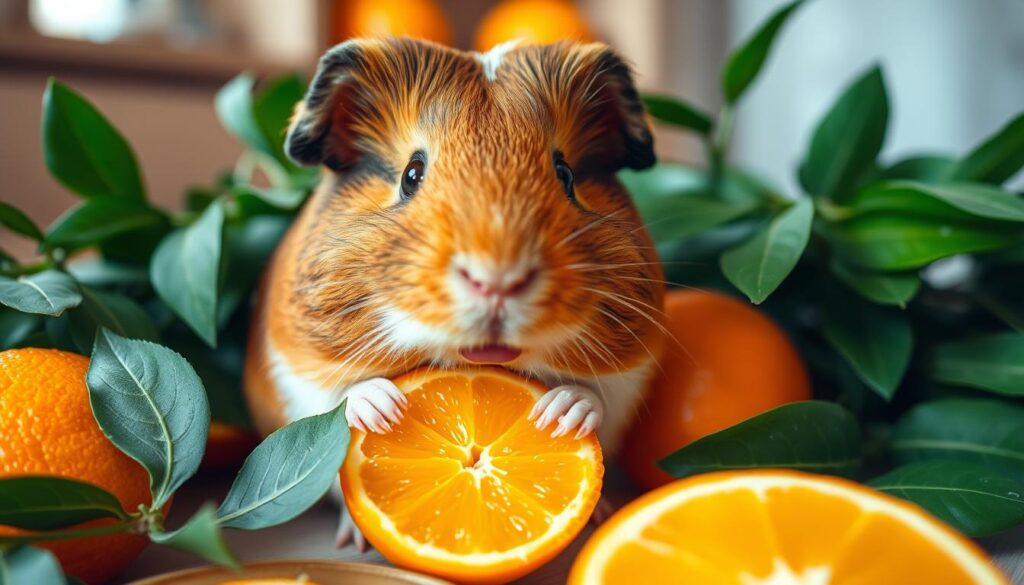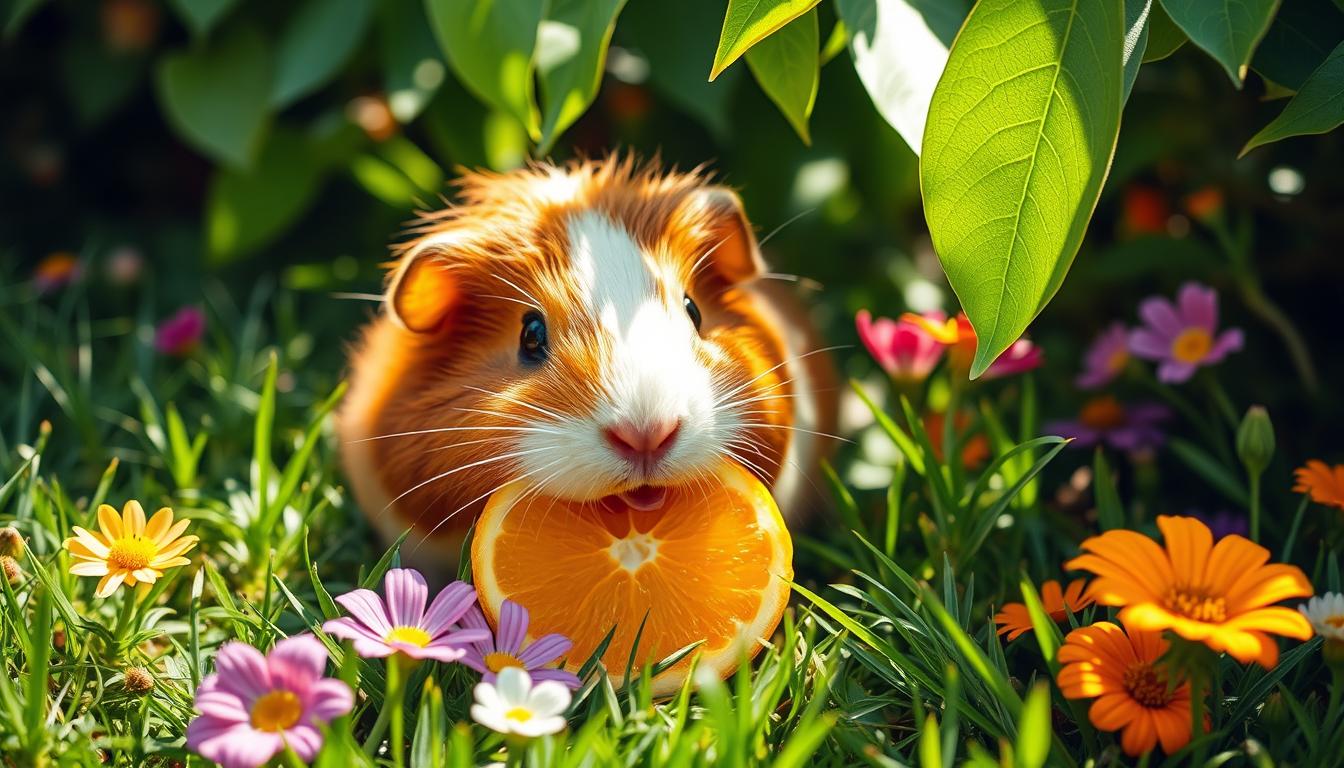As a proud guinea pig parent, I know the joy of watching your furry friend try new foods. Oranges are tempting with their bright colors and smells. But, it’s important to know how to safely add oranges to your guinea pig’s diet.
The guidelines on guinea pig feeding say oranges can be a good treat. But, it’s important to not give too much. Oranges can be risky if eaten too much. We’ll look at the good, right amounts, and possible dangers to keep your guinea pig safe and happy.
Table of Contents
Understanding Oranges and Guinea Pig Nutrition
Many pet owners love giving oranges to their guinea pigs. But, it’s key to know the good and bad of oranges for these furry friends. Oranges have nutrients that help guinea pigs stay healthy. Yet, they should only have oranges sometimes because of their sugar.
Key Nutrients in Oranges
Navel oranges, a favorite type, offer important nutrients. Here’s what you get in 100 grams:
- 13 grams of carbohydrates, with 2.2 grams of dietary fiber and 8.5 grams of sugar
- 43 milligrams of calcium
- 51 milligrams of vitamin C
Daily Nutritional Requirements for Guinea Pigs
Guinea pigs need a special diet to stay healthy. They should eat mostly hay, 80-90% of their food. Vegetables and herbs should make up 10-15%. Pellets should only be 5-10% of their diet.
Vitamin C Benefits for Guinea Pigs
Vitamin C is vital for guinea pigs because they can’t make it themselves. It helps prevent diseases in their skin and organs. Oranges are a good source of vitamin C. But, they should be given in small amounts because of their sugar. Too much sugar can cause weight gain and health problems.
Safety of Feeding Oranges to Guinea Pigs
Oranges are safe for guinea pigs in small amounts. Pick fresh, ripe, and organic oranges to avoid harmful chemicals. Make sure to remove seeds or pits to prevent choking.
The main worry is the sugar content in oranges. While oranges are good for vitamin C, too much sugar can cause health issues. Give oranges as treats only once or twice a week to keep things balanced.
- Opt for fresh, organic oranges to minimize exposure to harmful chemicals
- Remove seeds and pits to prevent choking hazards
- Monitor portion sizes to avoid overconsumption of sugar
- Introduce oranges gradually and observe your guinea pig’s reaction
By following these orange feeding precautions, you can safely add oranges to your guinea pig’s diet. This way, you can enjoy the benefits of oranges while keeping your guinea pig healthy.
Health Benefits of Oranges for Your Guinea Pig
Oranges are not just tasty for humans. They also offer health benefits for guinea pigs. The high vitamin C in oranges is key for these pets. It boosts their immune system and prevents scurvy.
Immune System Support
Guinea pigs can’t make their own vitamin C. This vitamin is vital for their health. The vitamin C in oranges helps make more white blood cells. These cells fight infections and diseases.
Digestive Health Benefits
The fiber in oranges also helps your guinea pig’s digestive health. It keeps bowel movements regular and supports a healthy gut. This is crucial for your pet’s well-being.
Antioxidant Properties
Oranges are full of antioxidants like flavonoids and carotenoids. These help fight free radicals and support your guinea pig’s health. They might even lower the risk of some cancers in your pet.
Adding oranges to your guinea pig’s diet can ensure they get the nutrients they need. Just introduce oranges slowly and in small amounts to avoid digestive problems.
How Much Orange Can I Give My Guinea Pig?
Feeding oranges to your guinea pig should be done with care. The guinea pig orange serving size is small, like the size of your thumb. This means only a few bites for your pet. Give orange treats no more than once or twice a week to avoid weight gain and stomach problems.
Hay should always be the main food for your guinea pig. Oranges and other fruits are treats, not everyday food. Start new foods slowly to prevent digestive issues or health problems.
| Nutrient | Navel Orange (per 100g) |
|---|---|
| Carbohydrates | 13g |
| Dietary Fiber | 2.2g |
| Sugar | 8.5g |
| Calcium | 43mg |
| Vitamin C | 1mg |
By sticking to these rules, your guinea pig can enjoy oranges’ health benefits safely. Always keep in mind moderation and a balanced diet for your pet’s health and happiness.

Potential Risks and Side Effects
Oranges can be good for your guinea pig, but there are risks. The sugar content in oranges is a big concern. Eating too many oranges can cause obesity, diabetes, and dental issues.
Oranges can also lead to digestive issues like diarrhea and bloating. Guinea pigs have sensitive stomachs. Changes in their diet can upset their gut, causing stomach problems.
Calcium-Related Problems
The high calcium content in orange peels is another risk. Guinea pigs with urinary stones or sludge are more at risk. This can be dangerous and may need surgery.
It’s important to watch how your guinea pig reacts to oranges. Also, only give them a little orange. If they show signs of illness, stop oranges and see a vet.
Knowing the risks and side effects of oranges helps keep your guinea pig healthy. This way, they can enjoy oranges safely without health problems.
Different Types of Citrus Safe for Guinea Pigs
Oranges might not be the best for your guinea pig, but other citrus fruits are safe. Mandarins, tangerines, satsumas, blood oranges, and clementines are good choices. They add flavor and nutrients to your pet’s diet.
It’s key to avoid canned citrus or juices. They have added sugars and lack fiber. Each citrus fruit has its own nutritional benefits. So, mix them up to give your guinea pig a balanced diet.
Remember, citrus fruits should be treats, not main meals. They can upset your guinea pig’s stomach if eaten too much. Talk to your vet about how much and how often to give them.
Safe Citrus Fruits for Guinea Pigs
- Mandarins
- Tangerines
- Satsumas
- Blood Oranges
- Clementines

Adding these safe citrus fruits to your guinea pig’s diet is a great way to keep them healthy. It’s a tasty and nutritious treat for your furry friend.
Proper Orange Preparation Guidelines
Preparing oranges for your guinea pig’s diet needs care. First, wash any organic oranges with hot water. This removes harmful chemical residues.
Washing and Cleaning Tips
After washing, remove the seeds to avoid choking hazards. Cut the fruit into small pieces your guinea pig can eat. This prevents digestive issues from tough orange sections.
Serving Size and Frequency
Feed your guinea pig a thumb-sized portion of orange flesh and a small piece of peel. Oranges should be treats, given once or twice a week. Always introduce new foods slowly to prevent upset stomachs.
By following these guidelines, your guinea pig can enjoy oranges safely. This ensures they get the benefits without risks from overfeeding or improper handling.
Orange Peels: Yes or No?
Are you wondering if it’s safe to give orange peels to your guinea pig? The answer is yes, but only in small amounts. Orange peels are good for your pet’s health.
Orange peels are packed with nutrients like fiber, vitamins, and antioxidants. These help keep your guinea pig’s immune system strong and their digestion healthy. But, the peels can be hard for some guinea pigs to chew and digest.
Before giving orange peels to your pet, make sure to wash them well. This removes harmful pesticides. Also, only give a little bit at a time because too much can upset their stomach.
Not every guinea pig likes orange peels. Watch how your pet reacts when you introduce them. If they don’t like it or seem uncomfortable, don’t give it to them. Stick to other safe fruits and veggies instead.
Potential Benefits of Orange Peels for Guinea Pigs
- Fiber-rich, which can aid in digestion and prevent constipation
- High in vitamins, including vitamin C, which is essential for guinea pigs
- Contain antioxidants that can support a healthy immune system
Potential Risks of Feeding Orange Peels to Guinea Pigs
- Tough texture can be difficult for some guinea pigs to chew and digest
- High concentration of citrus compounds and acidity can cause digestive issues if consumed in excess
- Potential pesticide residues on non-organic peels can be harmful if not properly washed
In conclusion, orange peels can be a good treat for your guinea pig, but do it carefully. Watch how your pet reacts and always put their health first.
Conclusion
Oranges can be a healthy treat for your guinea pig, full of vitamin C. Give them small amounts of fresh, organic oranges once or twice a week. This should be part of their balanced diet.
Always remember, hay should be their main food. Add vegetables and fruits like oranges in small amounts.
Watch how your guinea pig reacts to oranges. If you’re worried, talk to a vet. A healthy guinea pig eats mostly hay, with veggies and fruits like oranges.
By adding oranges carefully to their diet, you give them important nutrients. But, too much fruit can be bad. A balanced diet keeps your guinea pig happy and healthy for a long time.

